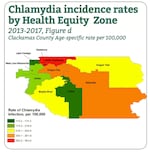Sexually transmitted diseases are surging.
A new study finds the rates of syphilis in Clackamas County, for example, increased 1,300 percent between 2007 and 2014.
Scientists say bacteria are becoming increasingly resistant to antibiotics and STDs are more easily spread in this era of mobile hook-up apps.

Courtesy: Clackamas County
In response, public health agencies like Clackamas County are flexing their significant powers to track-down partners when STDs get reported.
Nurse Mary Horman and disease intervention specialist Liz Baca both work with Clackamas County to tamp down STD rates. Most of their work is done over the phone: informing people they’ve had a partner who’s tested positive for gonorrhea or syphilis.
It’s a difficult conversation — and many people can’t be found over the phone. So about once a week, Horman and Baca jump into a car and start knocking on doors.
“It can definitely be scary at times, especially those rural areas where you’re really relying on the GPS to get you there and sometimes there are roads that lead you to nowhere," Baca said.

Disease intervention specialist Liz Baca and nurse Mary Horman go out knocking on doors to find people who may be infected with STDs like gonorrhea and syphilis.
Kristian Foden-Vencil / OPB
On a recent afternoon, the women were challenged by a dog and had to leave a trailer park empty-handed. They had the right area, but they didn’t know which door to knock on. And they couldn’t just ask around because neighbors might guess why the health department is tracking someone down, which would be a breach of medical privacy.
Their next call is a 64-year-old laborer who OPB is only identifying as Larry, for those same privacy reasons. He agreed to talk in the hope of warning other people about syphilis.
Larry took Baca and Horman to his back porch and the pair started to tell him how some diseases, like syphilis, are reportable — meaning that as soon as he was diagnosed, the doctor had to inform the county, which is why they’re at his door.

Larry watches as Liz Baca and Mary Horman explain some of the symptoms of syphilis
Kristian Foden-Vencil / OPB
Larry told them he’s already had penicillin delivered intravenously and he’s healing fine. But the conversation got tougher as Baca tried to understand the extent of Larry’s infection by showing him graphic pictures of sores and rashes.
“Another symptom of secondary syphilis is the loss of hair. You suddenly lose some hair. You’re thinking, ‘What’s going on?’ In a couple of weeks, it resolves. And you’re still infected. So, do you recall any of these symptoms?” Baca said.
“I do,” Larry said. “And I would probably say that the lesion, I think you called it, I think occurred. It was probably about 10 years ago.”
Larry said he lived a wild life, at times using drugs and hooking up with multiple anonymous partners from Craigslist. He said he didn’t care about his health and wasn’t getting tested for diseases.

Clackamas County hopes to stop the increase in STDs by tracking-down people with STDs and their partners.
Kristian Foden-Vencil / OPB
Baca and Horman gave him leaflets, condoms, lubricant and advice about getting free health care.
“I was a little nervous at first that they’d want a list of people,” he laughed. “But it wasn’t that way at all. I was relieved to find out that it wasn’t invasive: ‘Who are you sleeping with? What’s her name? You’re lying. Or you're not telling us the truth.' But it was very nice, very respectful.”
Baca said it’s too late to track down Larry’s anonymous partners from 10 years ago. It’s better to focus on more recent infections and populations at high risk, like undiagnosed pregnant women.
The public health officer for Clackamas County, Dr. Sarah Present, said syphilis in newborns can cause serious neurological complications and even death.
“We have multiple cases of congenital syphilis in our county just in this year, whereas that has been fairly unheard of for at least the last decade, if not more,” Present said.

Clackamas County health officer, Dr. Sarah Present, says the increase in STDs is dramatic and disturbing, “Within the last year we have seen our numbers dramatically increase to the point I’m quite concerned about it.”
The new study, released by Clackamas County on Thursday, shows rates of gonorrhea surged 162 percent over five years. For chlamydia, rates increased 26 percent over the same time.
Present called the increases dramatic and disturbing. “I’m quite concerned about it,” she said.
But Clackamas is not an outlier. Similar figures are being reported across the country. And that, Present said, is why Clackamas is dedicating more resources to aggressively track down partners and encourage testing — even if it might lead to family strife.
“We do our absolute best to have the initial case talk to their partners for us,” she said. “We don’t want to have to be the bad guys.”
Public health departments have substantial powers. They’re allowed to inspect, treat and quarantine anyone in an effort to prevent the spread of disease — even without consent. The power originates in English common law, which finds the rights of an individual can be limited for the common good. The most famous example is perhaps Mary Mallon, better known as Typhoid Mary. She was an asymptomatic carrier of typhoid who was forcibly isolated for decades at the turn of the 20th Century by New York's public health officials.

Courtesy: Clackamas County
Nobody’s advocating such draconian measures now, especially for sexually transmitted diseases which, as the name suggests, requires pretty close proximity to spread.
But counties are taking the issue seriously.
Clackamas has received a substantial grant to help pay for its extra outreach. Present, the county health officer, said they’re working with Multnomah and Washington counties because STDs don’t recognize boundaries.
Clackamas is taking several other steps to stop the transmission of STDs, like strengthening prevention activities, enhanced screening, testing high-risk populations and educating the public. The county also wants to better support people who test positive, expand its investigations and unite community leaders on this important issue.

Sometimes the search for people who may be infected with an STD is not easy. At this mobile home park, Liz Baca and Mary Horman couldn't ask neighbors, because doing so would be a breach of their subject's medical confidentiality.
Kristian Foden-Vencil / OPB
Back on Larry’s porch, he said once he found out why his health was failing, he took the infection seriously.
“Because really, truly for me, it was going to be a matter of life and death,” he said.
And saving lives is why Baca and Horman do this work, even if it’s uncomfortable sometimes.
After the talk, they climbed back into their car, which was pointed away from Larry's home — just in case he wasn’t so accommodating.
“There’s those areas where you’re entering a property and there’s none in sight and dogs can be scary,” Baca said. “You have to run very fast if you see them.”
And with that, the pair was back on the road, on to the next call.

Courtesy: Clackamas County
